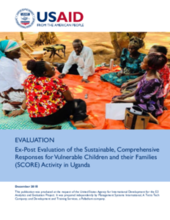ABSTRACT
This ex-post evaluation examines the sustainability of outcomes from USAID’s Sustainable, Comprehensive Responses for Vulnerable Children and their Families (SCORE) activity. SCORE developed family-specific plans to “graduate” households from activity support. The activity focused on capacity building, improving socioeconomic status, food security, and access to protection and legal services. The evaluation collected qualitative data from beneficiaries and key stakeholders across seven districts in Uganda.
The evaluation found that households learned new skills and knowledge to help them mitigate their challenges, including village savings and loan associations, home gardening, and farming. However, financial instability remains a common challenge among households, and their circumstances and levels of vulnerability vary widely. About 88 percent of households reported experiencing a shock or stressor in the last year, although nearly 40 percent felt they did not have the ability to handle shocks, and 26 percent felt they could handle shocks but with difficulty. Respondents felt that SCORE did not provide enough support for the most critically vulnerable households (e.g., elderly, disabled).
The evaluation concluded that SCORE’s strengthening of households’ skills reduced the impact of shocks and stressors for many households. However, there is a need to examine hindering factors, particularly those beyond the activity’s control such as natural disasters that can have a huge economic impact on households that rely on farming. As one of the first graduation models of its kind, lessons learned from SCORE – both positive and negative – require further testing and time, and strong monitoring and evaluation practices to continue to learn from them.

